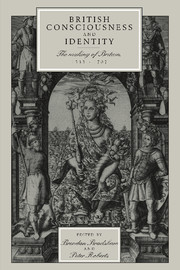Book contents
- Frontmatter
- Contents
- Notes on the contributors
- Preface
- Introduction
- 1 Tudor Wales, national identity and the British inheritance
- 2 The English Reformation and identity formation in Ireland and Wales
- 3 Faith, culture and sovereignty: Irish nationality and its development, 1558–1625
- 4 From English to British literature: John Lyly's Euphues and Edmund Spenser's The Faerie Queen
- 5 The British problem in three tracts on Ireland by Spenser, Bacon and Milton
- 6 James Ussher and the creation of an Irish protestant identity
- 7 Seventeenth-century Wales: definition and identity
- 8 Scottish identity in the seventeenth century
- 9 The Gaidhealtachd and the emergence of the Scottish Highlands
- 10 ‘No remedy more proper’: Anglo-Irish unionism before 1707
- 11 Protestantism, constitutionalism and British identity under the later Stuarts
- Index
Preface
Published online by Cambridge University Press: 15 March 2010
- Frontmatter
- Contents
- Notes on the contributors
- Preface
- Introduction
- 1 Tudor Wales, national identity and the British inheritance
- 2 The English Reformation and identity formation in Ireland and Wales
- 3 Faith, culture and sovereignty: Irish nationality and its development, 1558–1625
- 4 From English to British literature: John Lyly's Euphues and Edmund Spenser's The Faerie Queen
- 5 The British problem in three tracts on Ireland by Spenser, Bacon and Milton
- 6 James Ussher and the creation of an Irish protestant identity
- 7 Seventeenth-century Wales: definition and identity
- 8 Scottish identity in the seventeenth century
- 9 The Gaidhealtachd and the emergence of the Scottish Highlands
- 10 ‘No remedy more proper’: Anglo-Irish unionism before 1707
- 11 Protestantism, constitutionalism and British identity under the later Stuarts
- Index
Summary
As the multinational states of Eastern Europe crumble, and the longer established ones to the west continue to be vulnerable to militant agitation for secession on the part of minority nationalities comprehended within them, the historic stability of the United Kingdom begins to seem something of a phenomenon. By reason of the particular perspective which it adopts – on which see the Introduction – the collection of essays presented here is offered in the belief that it sheds light upon the secret of the remarkable stability of the British multinational conglomerate. At the same time it also points up the fragility of the Union, not least in the form of its historic and ongoing Irish problem. Finally in terms of a contribution to the ‘new subject’ of British history it aims to fill a niche not hitherto adequately provided for so far as the early modern period is concerned – on which also see the Introduction. In that respect it may perhaps be claimed that with its appearance the pioneering phase in the development of the new subject has been brought to completion at least so far as concerns the early modern period.
Some debts remain to be gratefully acknowledged. First the editors wish to thank the young historians who comprise their co-contributors. Their ready response to the invitation to join the project and their cooperation at all stages has been a continuing source of encouragement to the editors in overcoming unanticipated difficulties.
- Type
- Chapter
- Information
- British Consciousness and IdentityThe Making of Britain, 1533–1707, pp. xi - xiiPublisher: Cambridge University PressPrint publication year: 1998

